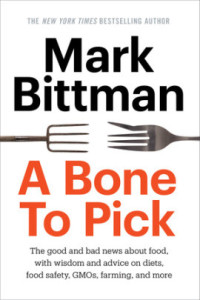 Lacy and I are both big fans of Mark Bittman, his numerous cookbooks and especially his VB6 idea. However, not being a New York Times subscriber or follower I’ve mostly missed out on his weekly opinion pieces there and his contributions to the Sunday NYT magazine. A Bone To Pick fixed that in one fell swoop!
Lacy and I are both big fans of Mark Bittman, his numerous cookbooks and especially his VB6 idea. However, not being a New York Times subscriber or follower I’ve mostly missed out on his weekly opinion pieces there and his contributions to the Sunday NYT magazine. A Bone To Pick fixed that in one fell swoop!
Food politics can be polarizing and/or depressing, but I found reading this book to be galvanizing, no-nonsense, and practical. Bittman offers many solutions and a can-do attitude, including impacts we can have as individual consumers (as simple as COOK AT HOME!) and ways in which we need to holler at our elected representatives. A Bone To Pick is filled with “the Good and Bad News about Food, with Wisdom and Advice on Diets, Food Safety, GMOs, Farming, and More.”
Obviously Lacy & I are proponents of cooking at home, and we are also huge advocates of voting-with-your-dollars and using our food choices to influence the market. This book provides both backing for what we’ve been doing and ideas for how to do more. In Bittman’s words:
“Cooking has never felt more important than it does now. If you want control of what you eat, if you want to help change the way food is produced, if you want to maximize your health and minimize your impact on the environment in general and climate change in particular, you simply have to cook[!]”
WOW – Could that be any more powerful? That last sentence is definitely in need of an exclamation point!
Each chapter is the text from one of his opinion pieces from the past 1-4 years. Being newspaper article length and reading level, they are really quick to read and succinct. The downside of that is that the pieces might be, should be, you hope are slightly out of date – but that would be optimistic or pessimistic depending on the progress made on these issues in the marketplace and legislatively.
If you’re unfamiliar with Bittman’s work, his overarching premise is that “the standard American diet – too much meat, sugar, and hyperprocessed junk – is fueling an astronomically expensive epidemic of preventable lifestyle diseases for which we are all paying.”
To illustrate this, I’m going to pull out some of the more eye-opening quotes here. We’ve got a cool “tweet this” button if you’re on Twitter – raising awareness of these issues is a great first step. For Facebook-ers, when you read a quote that moves you – copy & paste to share it! Be sure to credit the quote to Mark Bittman, and link to this post so your friends can read more.
“Food-related deaths are far more common than those resulting from terrorism, yet the FDA’s budget is about 1/15th that of Homeland Security.” – Mark Bittman, A Bone To Pick
“A global population growth of less than 30% is projected to double the demand for animal products. But there is not the land, water, or fertilizer – let alone the health care funding – for the world to consume Western levels of meat.” – Mark Bittman, A Bone to Pick
“The global food price index is at a record high, and our agricultural system is wreaking havoc with the health not only of humans but of the earth. There are around a billion undernourished people; [yet] we can also thank the current system for the billion who are overweight and obese.” – Mark Bittman, A Bone to Pick
“Fun/depressing fact: It takes the earth 18 months to replenish the amount of resources we use each year. Looked at another way, we’d need 1.5 earths to be sustainable at our current rate of consumption.” – Mark Bittman, A Bone to Pick
“Chronic exposure to pesticides is damaging not only to flora but to all creatures, including the one that habitually considers itself above it all: us.” – Mark Bittman, A Bone to Pick
“The average American is exposed to 10 or more pesticides every day, via diet and drinking water….Pesticide drift is a term used to describe the phenomenon by which almost all pesticides…wind up on or in something other than their intended target. [Add to that the fact that] around 95% of all seeds for soy, corn, and cotton contain a pesticide-resistant gene, which encourages wanton spraying…Organic food production would reduce our overall exposure to pesticides by 97%; that is, all but eliminate it.” – Mark Bittman, A Bone to Pick
“So-called conventional agriculture can shed much of its chemical use – if it wants to…[It] is a matter of paying people for their knowledge and smart work instead of paying chemical companies for poisons.” – Mark Bittman, A Bone to Pick
“If Americans were to meet the dietary recommendations for fruit and vegetables, we’d need to more than double our fruit and vegetable acreage.” – Mark Bittman, A Bone to Pick
“There is a lot of lawn in this country. In fact, it’s our biggest crop, three times as big as corn…Lawns are not exactly the enemy, but they’re certainly not helping matters any.” – Mark Bittman, A Bone to Pick
“Around 1/3 or more of the world’s population is badly (“mal”) nourished [- This] conflates hunger and diet-spawned illnesses like diabetes, both of which are preventable…With a lack of money comes either not enough food or so-called empty calories, calories that put on pounds but do not nourish.” – Mark Bittman, A Bone To Pick
“Livestock production generates nearly 1/5th of the world’s greenhouse gases – more than transportation…if Americans were to reduce meat consumption by just 20% it would be as if we all switched from a standard sedan – a Camry, say – to the ultra-efficient Prius.” – Mark Bittman, A Bone To Pick
“About 2-5 times
more grain is required to produce the same amount of calories through livestock as through direct grain consumption…[and] it is as much as 10x more in the case of grain-fed beef in the US.” – Mark Bittman, A Bone To Pick
“”When you look at environmental problems in the U.S.,” says Professor Eshel [of Bard College], “nearly all of them have their source in food production and in particular meat production…The good of people’s bodies and the good of the planet are more or less perfectly aligned.” – Mark Bittman, A Bone To Pick
Which reminds me, BTW, of a great article and graphic from Treehugger: Do You Eat for Health or Environmental Sustainability? The Double Pyramid Says You Can Do Both.
A bit of good news among all this – in a 2012 piece, Bittman notes “a 12% reduction [in meat consumption] in just 5 years” – ie from 2007-2012 Americans bought 12% less meat. Back in 2012, we were working with 2010 USDA Dietary Guidelines. Those who follow these kinds of things are looking forward to the 2015 guidelines which will be released later this year. It is hoped and expected that this year’s USDA recommendations will suggest an even smaller daily meat intake in an aim to reflect not only what is “best” for humans, but also take into account the environmental impacts of meat consumption. (Read more: The Washington Post, “The Meat Industry’s Worst Nightmare Could Soon Become a Reality.”)
“The CAFO system has major impacts on environmental and human health, rural communities, and animal welfare. And basically, taxpayers pay for it all: we subsidize the production of cheap grain used as feed, and are ultimately stuck bearing the environmental, public health, and socioeconomic costs of industrial livestock production.” – Kai Olson-Sawyer (Grace Communications Foundation), via Mark Bittman, A Bone To Pick
“The ubiquity, convenience and habit-forming appeal of hyperprocessed foods have largely drowned out the alternatives: there are 5 fast-food restaurants for every supermarket in the US;…[the] price of fresh produce has increased by 40% while the price of soda and processed food has decreased by as much as 30%; and nearly inconceivable resources go into encouraging consumption in restaurants.” – Mark Bittman, A Bone To Pick
I’m finding myself tempted to quote about 80% of this chapter/article, so instead I’ll refer you to the NYT’s full version of it: Is Junk Food Really Cheaper? Since I don’t eat at fast-food restaurants, I can’t eat there less. But I can further cement my choice to boycott, and our choice to cut the cable and be a commercial-free household. I once went to the doctor and she was asked about my eating choices. I told her that if fast-food is the only choice (which it rarely is), I’d just skip that meal instead. I thought she’d get on my case about not eating – not eating is not healthy, right? Nope, she was nodding in full support – not eating at all is better than eating non-food hyperprocessed garbage. I (obviously) felt that way, but to have a physician agree really made an impression.
“Your right to harm yourself stops when I have to pay for it…Just as we all pay for the ravages of smoking, we all pay for the harmful effects of Coke, Snapple, and Gatorade…Sugar-sweetened beverages are nothing more than sugar delivery systems, and sugar is probably the most dangerous part of our current diet.” – Mark Bittman, A Bone To Pick
Alright, this is another one I’d just quote the heck out of so I’ll refer you instead to It’s the Sugar, Folks. Again, I don’t drink soda, but now I REALLY don’t. Remember when kids of the 80s would hide or destroy their parents cigarettes after hearing how bad they were at school? If the implications of the studies and findings about soda et al ever can overcome American politics and farm-policy to become a part of the warnings issued in public schools we’ll hopefully have kids pouring their parents’ Cokes down the drain and pushing us toward the future. But that’s awfully hopeful. 🙁
I think the chapter that really bugged my eyes out of my head and exposed me to a thought I’d never before run across or considered was Is Alzheimer’s Type 3 Diabetes? If Alzheimer’s is one of your worries or “runs in your family” this is a MUST READ.
“In case you need another reason to cut back on junk food, it…turns out that Alzheimer’s could well be a form of diet-induced diabetes.” – Mark Bittman, A Bone To Pick
“The fact that Alzheimer’s can be associated with low levels of insulin in the brain is the reason why increasing numbers of researchers have taken to calling it Type 3 Diabetes, or diabetes of the brain.” – Mark Bittman, A Bone To Pick
“The American diet is a fast track not only to obesity but to Type 2 diabetes and other preventable, non-communicable diseases, which now account for more deaths than infectious ones.” – Mark Bittman, A Bone To Pick
Or if you prefer this version:
Or, to be really in your face, that quote above could just be shorte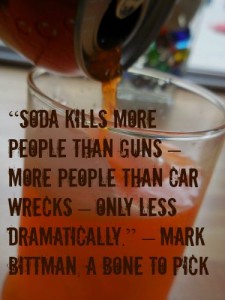 ned to “soda kills.” Maybe all caps, in case it isn’t alarming enough: “SODA KILLS.”
ned to “soda kills.” Maybe all caps, in case it isn’t alarming enough: “SODA KILLS.”
“As long as sugar is profitable and 100% unrestricted (and subsidized and protected!), marketers will try to get 2-year-olds hooked on soda and Gatorade.” – Mark Bittman, A Bone To Pick
“If we all ate the recommended amounts of fruits and vegetables, we’d save more than 100,000 lives and something like $17 billion in health care costs.” – Mark Bittman, A Bone To Pick
Did you know there is a Diner’s Guide to Ethical Eating? And it isn’t about how well treated the animals were, those now being served (tell me you’ve seen that episode of Portlandia, right?). Nope, this one is about ethical treatment of humans – the 10 million humans working in US restaurants. It rates how well restaurants treat their employees, and is another great thing I learned about by reading this book. As Bittman says,
“If you care about sustainability – the capacity to endure – it’s time to expand our definition to include workers. You can’t call food sustainable when it’s produced by people whose capacity to endure is challenged by poverty-level wages.”
“Federal and local governments…are largely responsible for deciding what we eat, because they refuse to restrict the behavior of producers and marketers, who then infallibly choose the most profitable – not the most healthful or even least destructive – paths.” – Mark Bittman, A Bone To Pick
“Our job as citizens is to support the production of energy and food by the most sustainable and least damaging methods scientists can devise. If that’s genetic engineering, fine. But to date it hasn’t been; in fact, the technology has been little more than an income-generator for a few corporations desperate to see those profits continue regardless of the cost to the rest of us, or to the environment.” – Mark Bittman, A Bone To Pick
“Working to make food fair and affordable is an opportunity for this country to live up to its founding principles.” – Mark Bittman, A Bone To Pick
“Nothing reflects our moral core more accurately than the abuses we overlook in the names of convenience and economy.” – Mark Bittman, A Bone To Pick
If you’d like to hear more or get briefed here’s a 20 minute Bittman TED Talk that covers most of the bases. Unfortunately it’s from 2008, but also unfortunately it doesn’t sound like much has changed.
This all seems like a lot to care about, but really what could be more important? I agree it’s overwhelming, but we can and should each pick a part to focus on (buying less/better meat, reducing sugar-dependency, cooking at home, etc) for starters and become more aware of the issues surrounding our daily food choices.
Cows Image: Photo Credit: carper123 via Compfightcc
Soda Image: Photo Credit: Bluwatergirl via Compfightcc
This book was provided t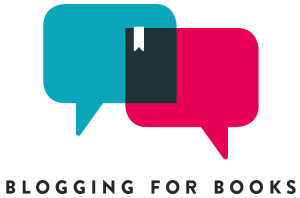 o me free to review by Blogging for Books, a service of The Crown Publishing Group. Opinions are entirely my own.
o me free to review by Blogging for Books, a service of The Crown Publishing Group. Opinions are entirely my own.

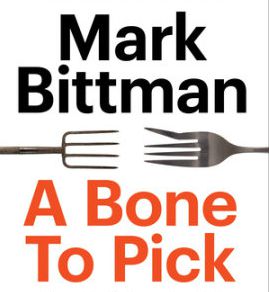
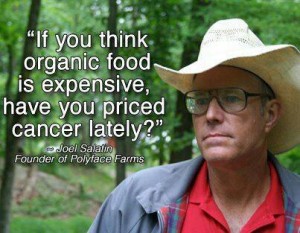
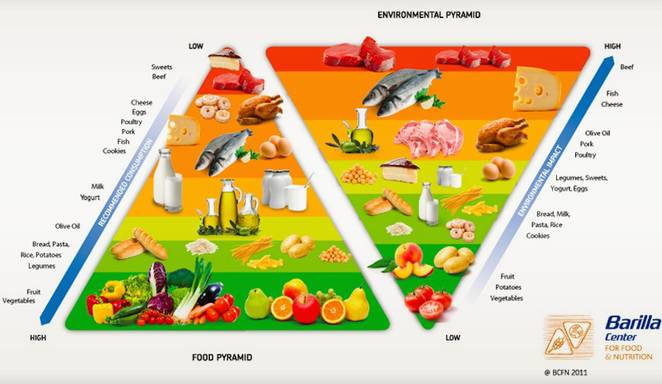
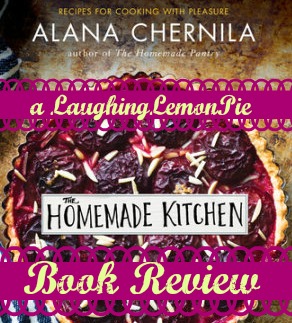
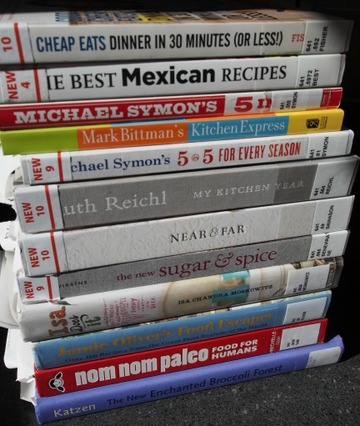
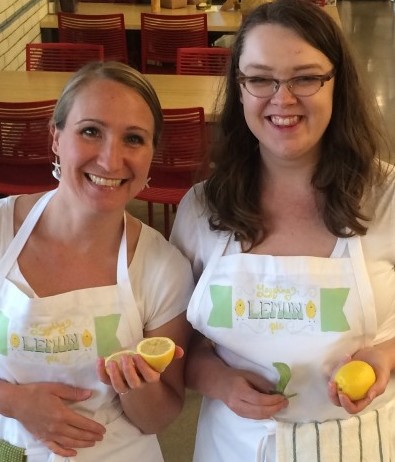
I have not read this one. I guess I have to. I was just musing over the statistic that we (North Americans) spend less on food than any other nation. I am always trying to get people to see "the real cost of food." I have a very successful garden this year and it made me feel like I have reconnected with food. It is not easy to grown organic food but well worth it. Great post!
Thank you! I agree, it is hard to see the big picture when those “sale” signs go up touting 99cent baskets strawberries – I struggle with that one, seeing the price in-store vs the price to my health and the environment.